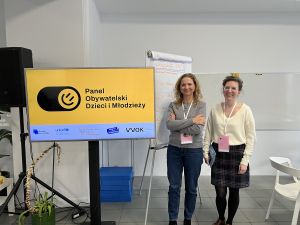In March 2025, the first-ever Youth Citizens’ Assembly in Poland (PODiM) was launched – a unique deliberative process aimed at engaging young people aged 15–18 in public decision-making. The panel focused on the topic of online safety for children and adolescents, with the goal of developing concrete policy recommendations to be submitted to the Ministry of Digital Affairs and organisations working on behalf of young citizens. The initiative is led by the Pole Dialogu Foundation in cooperation with UNICEF Poland, supported by the Ministry of Digital Affairs, and funded through the Digital Democracy Accelerator (People Powered) programme.
The research team from the Democratic Innovations project observed the entire process. Prof. Paulina Pospiesznaserved as Chair of the Standards and Procedures Committee, ensuring the panel's quality and alignment with established citizens’ assembly methodology. In addition, we conducted pre- and post-panel surveys among the participants to assess their experiences, knowledge, and perceptions of civic empowerment. These findings will contribute not only to academic research but will also be included in the organisers’ final report.
The panel followed a proven deliberative format inspired by similar initiatives in Ireland, Germany, and Switzerland. Participants were selected through a lottery from 32 secondary schools across Poland to ensure representativeness in terms of gender, location, and type of school. The process consisted of four stages: an introductory meeting, an educational phase, a deliberative phase, and finally, dissemination of the results.
The educational phase featured experts from various institutions, including: UNICEF Poland, Empowering Children Foundation (Fundacja Dajemy Dzieciom Siłę), Rethink Foundation / Institute for Social Safety, Otwarte Zasoby, Jagiellonian University, the Ministry of Digital Affairs, Demagog Association, as well as representatives from Google, NASK, and PKDP.
Topics covered included children’s rights, harmful content online, the impact of the internet on mental health, protection strategies, and the roles of state institutions. After the educational weekend, participants worked together to develop a set of recommendations.
The entire process was documented and shared via Instagram: @cotynato.
